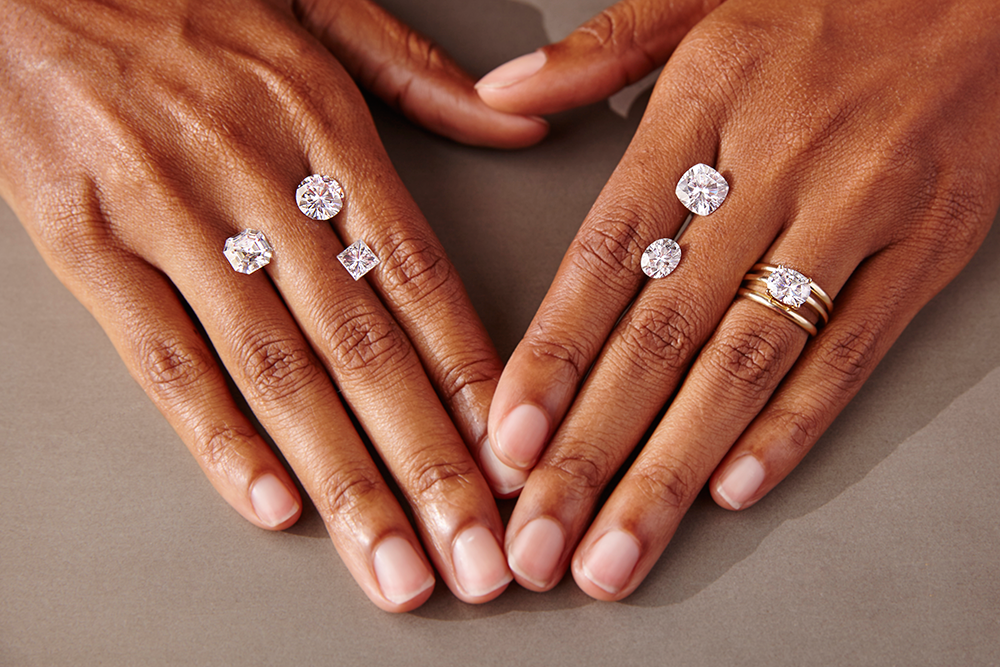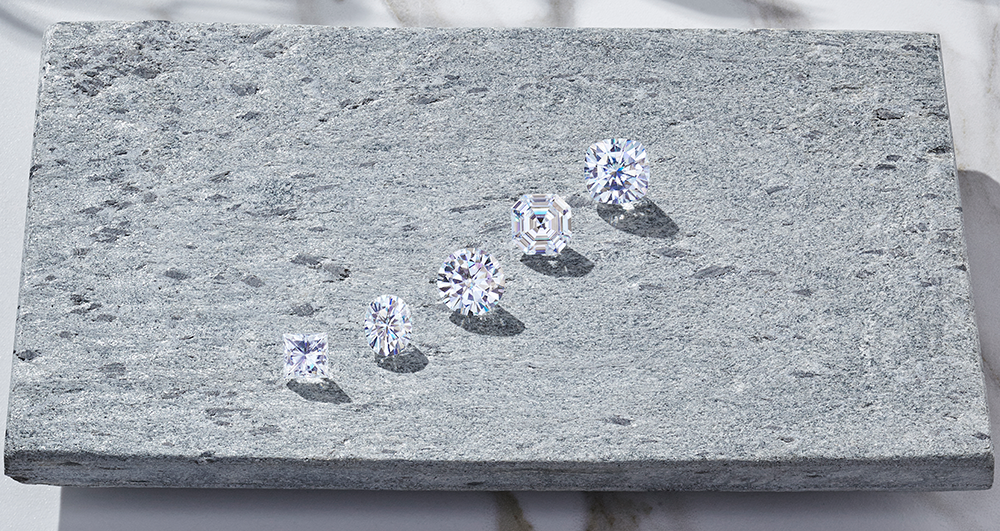Lynne Armstrong-Ramirez has a routine that she uses with her customers. When someone comes in for a diamond ring, the 32-year-old owner of LARC Jewels puts a diamond and a moissanite in front of them. Then she says nothing.
“They always choose moissanite,” says Armstrong-Ramirez, who opened the Dallas custom jewelry salon in 2012 with her husband Andy Ramirez. “The stone puts on a light show that no one can resist.”
Where other jewelers may feel uncomfortable presenting such a comparison, this jeweler welcomes it. LARC Jewels’ sales of moissanite, born of a meteorite and grown in the labs of Charles & Colvard near North Carolina’s Research Triangle Park, are nearing 50 percent.
 Charles & Colvard’s Forever One™ moissanite is available in a variety of shapes and sizes.
Charles & Colvard’s Forever One™ moissanite is available in a variety of shapes and sizes.
The company’s newest offerings — Asscher-cut stones in clear white Forever OneTM moissanite (colorless D-E-F grade gemstones) — give jewelers more reasons than ever to present them as a viable choice in fine jewelry. Combined with affordability, higher retailer margins and the fact that it’s ethically sourced, and you’ve got a win/win situation. “Forever OneTM has been a game changer,” Armstrong-Ramirez says. “And when our customers find out that moissanite is within their budget and conflict-free, you can sense their relief.”
Good Works, Good Margins
As the industry works to unravel the complicated issues surrounding diamond origin, Charles & Colvard is way ahead of the game. Moissanite is lab-grown in the USA and created in a 21st-century environment, far away from politics, mine pits and provenance.
Research shows that millennials, the generation that came of age in the first decade of the 21st century, are careful where they place their dollars. And they do their homework, searching for brands to believe in.
According to Suzanne Miglucci, Charles & Colvard’s president and CEO, today’s consumer wants more from their jewelry than their parents did. “Ethical sourcing is all about products that are manufactured using fair labor practices and doing no harm to the environment. We’ve been ethically sourcing for more than 20 years.”
 Amazingly bright and brilliant Forever One™ moissanite from Charles & Colvard
Amazingly bright and brilliant Forever One™ moissanite from Charles & Colvard
Some modern-day jewelers have taken matters into their own hands. After a particularly “awful experience” trying to buy jewelry, 28-yearold Krish Himmatramka of Houston, TX, decided to create his own jewelry e-commerce site, tying the sale of wedding jewelry directly to a cause. A mechanical engineer by trade, he launched DoAmore.com in 2012. When someone buys a piece of jewelry, two people get clean water from the company’s wells in Ethiopia, Haiti, India, Bangladesh and Nepal. Today, almost 50 percent of the engagement rings he sells contain moissanite. “Moissanite makes it easy,” he says. “It’s eco-friendly and grown in North Carolina. You can’t get much better than that.”
How do Main Street retailers merge moissanite into their product mix? It can be as simple as making sure there’s a sample case of loose goods at the ready. Moissanite gemstone kits and educational materials are available to make the sell-in as easy as possible. Loose goods are available from Charles & Colvard supplier partners, including Stuller and Rio Grande. (For a complete list, visit charlesandcolvard.com/authorized-distributors.)
With excellent margins and more variety than ever, there’s never been a better time for jewelers to embrace the lab-grown, ethical gem as a new generation comes of age. Moissanite is good business sense.